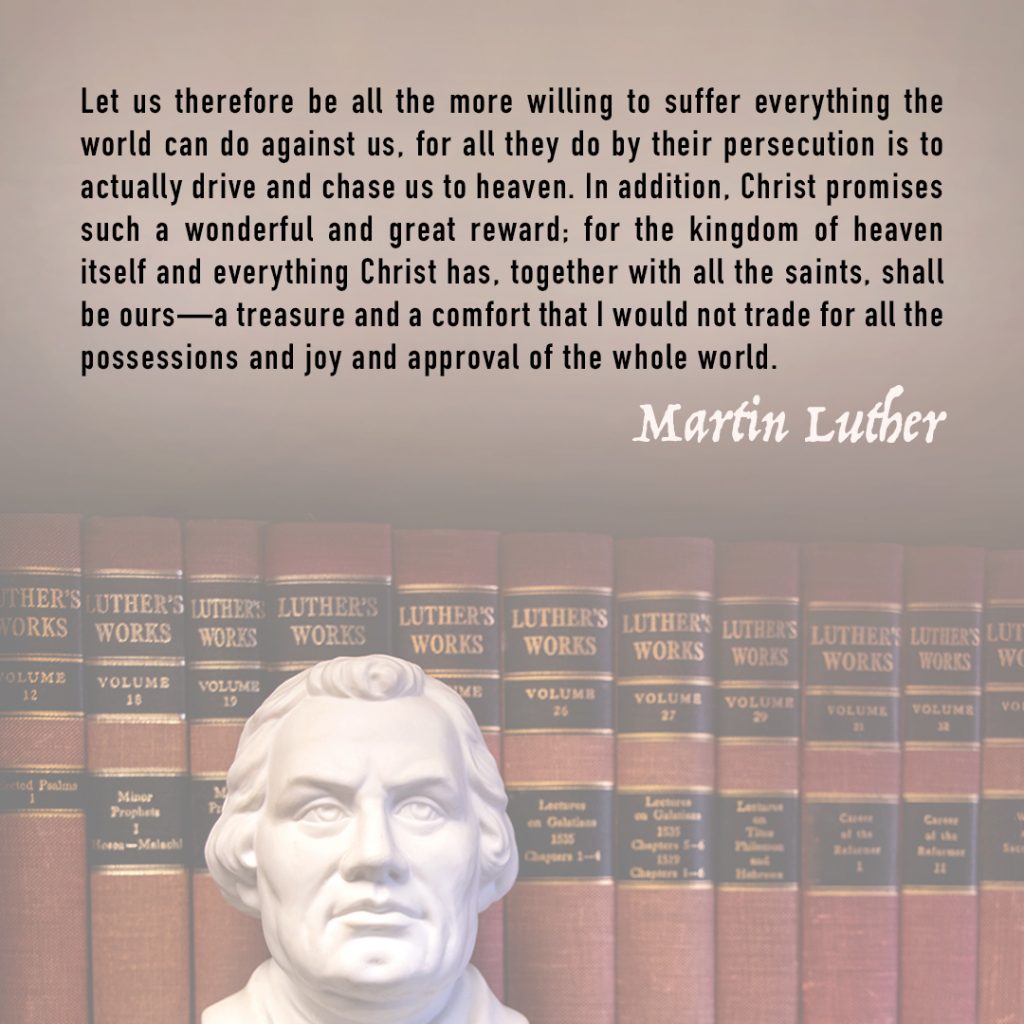A Strange Blessing for the Saints

by Timothy Teuscher
The appointed Gospel reading for All Saints’ Day, November 1, includes the opening words from Jesus’ Sermon on the Mount called ‘The Beatitudes,’ in which He speaks of the blessedness, the spiritual well-being, of saints—of what it means to be saints, that is, holy people. All Saints’ Day serves as a kind of transition to the end of the church year, the emphasis of which is on what the Scriptures say about the end of this world and the Last Day. It is the eighth and final beatitude, therefore, that is most applicable to All Saints’ Day. It deals specifically with Jesus’ words concerning the signs of the end times, and seems to be a rather strange blessing.
All Saints’ Day serves as a kind of transition to the end of the church year, the emphasis of which is on what the Scriptures say about the end of this world and the Last Day.
He says: “Blessed are those who are persecuted for righteousness’ sake, for theirs is the kingdom of heaven. Blessed are you when others revile you and persecute you and utter all kinds of evil against you falsely on My account. Rejoice and be glad, for your reward is great in heaven, for so they persecuted the prophets who were before you” (Matthew 5:10-12).
As we consider these words of Jesus, we cannot but think back to those saints and martyrs of the early church who were brutally put to death in the arena by the Roman government; to the millions of believers who perished under oppressive totalitarian regimes in Nazi Germany or the Soviet Union just this past century; and to those Christians in various countries today who are the regular targets of terrorists and imprisoned and executed for confessing Jesus Christ as Lord.
But this persecution of those who bear the name of Christ is not, however, limited to those nations where it is illegal to speak to others concerning Jesus or for a person to even convert to the Christian faith. No, even here in our own society, which prides itself on protecting people’s rights and freedoms and which claims to be tolerant of all people, there is one group that is more and more reviled and facing intolerance: those who bear and confess the name of Christ. Witness, if you will, the entertainment industry or the media or our educational institutions or government policies that, in one way or another, ridicule and belittle, insult and persecute the Christian faith and those who confess Jesus Christ as Lord and Saviour.
It is not only proper but also beneficial to do that which our Lutheran Confessions declare: “Saints should be kept in remembrance so that our faith may be strengthened when we see what grace they received and how they were sustained by faith. Moreover, their good works are to be an example for us, each of us in his own calling” (Augsburg Confession XXI).
Why is this so? Why do people insult and hate, ridicule and falsely say all kinds of evil against those who confess the holy, precious name of Jesus? The Reformer, Martin Luther, answers that in his commentary on the Beatitudes: “Anyone who wants to have Christ must put in jeopardy his body, life, goods, reputation, and popularity in the world and, instead, suffer contempt, ingratitude, and persecution. And the reason is simply this: the devil will not and cannot stand seeing a person enter the kingdom of God.”
Think about it: to believe, teach, and confess that people are not by nature good and upright but sinful; that unless a person repents, he or she will perish eternally; that Jesus Christ alone is the Way, the Truth, and the Life; that it is by faith and faith alone in this Jesus, and not by our so-called good works and good life, that a person is made acceptable and pleasing to God and thus saved eternally… Do not these teachings and beliefs fly in the face of every religious notion and idea of the world’s? Are they not offensive to many people, causing them to revile, to hate, and even to persecute us?
This is why it is not only proper but also beneficial to do that which our Lutheran Confessions declare: “Saints should be kept in remembrance so that our faith may be strengthened when we see what grace they received and how they were sustained by faith. Moreover, their good works are to be an example for us, each of us in his own calling” (Augsburg Confession XXI).
To be sure, the eighth beatitude is a rather strange blessing! Blessed when we are persecuted? Blessed when we are reviled? Blessed when people utter all kinds of evil against us? But hear again that sure and certain promise of our Lord to those who are so blessed: “Rejoice and be glad, for your reward is great in heaven, for so they persecuted the prophets who were before you.”

“Let us therefore,” Luther concludes in his commentary on the Beatitudes, “be all the more willing to suffer everything the world can do against us, for all they do by their persecution is to actually drive and chase us to heaven. In addition, Christ promises such a wonderful and great reward; for the kingdom of heaven itself and everything Christ has, together with all the saints, shall be ours—a treasure and a comfort that I would not trade for all the possessions and joy and approval of the whole world. If you thus want to have the Gospel and Christ and eternal life, then know that in this life you must count on having trouble, conflict, and persecution wherever you go.” And is that not a great blessing?
———————
Rev. Timothy Teuscher is President of Lutheran Church–Canada (LCC).




